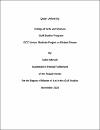GCC Union: Realistic Project or Distant Dream
Abstract
This thesis aims at shedding light on the withdrawal of the ambassadors of Saudi Arabia, the UAE and Bahrain from Doha from 5 march 2014 till 16 November, reportedly as a sign of protest against Qatar, and its dynamic foreign policy in favor of political Islam notably following the coming to power of President Mohammad Morsi in Egypt, and the fall of some Arab leaders such as Zine Al Abidine of Tunisia, and Colonel Muammar Al Gaddafi of Libya as part of the Arab Spring Revolutions, which started by the beginning of 2011. The thesis attempts to examine the impact of the ambassadors' withdrawal from Doha on the Gulf Cooperation Council, and its prospects for a greater unification to crown the integration project initiated in 1981 with the creation of the GCC. The thesis is made up of six chapters which trace the genesis of the crisis, provide a historical and conceptual background of the GCC to better understand this regional organization, and try to gauge the damage caused by this incident on the GCC, and to determine the aspects affected by this move as well. The thesis has used a qualitative method based on personal interviews to get in-depth explanations for this dispute which has apparently jolted this young integration project, and has aroused much doubt about the cohesion and solidity of the organization, and its ability in coping with new developments and events. The paper ends up with a conclusion which provides an answer to the main question raised by the thesis namely the impact of the ambassadors' withdrawal on the GCC on the basis of the results stemming from the interviews, and gives hints about the future prospects of this regional integration project following a period which lasted only eight months, but it was very hard for the GCC which had to strive to settle the dispute.
DOI/handle
http://hdl.handle.net/10576/3274Collections
- Gulf Studies [77 items ]


